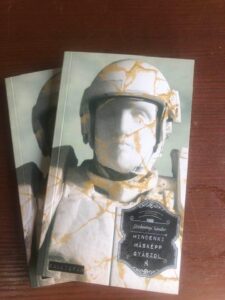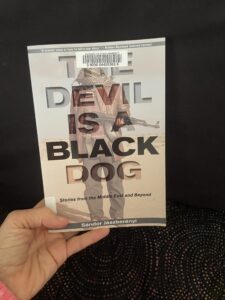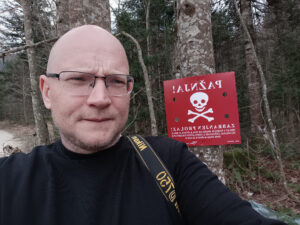Disclaimer: this post contains references to texts related to violence, trauma, and PTSD.

Second edition just published (Image: Kalligram on Facebook)
As a supporter of bibliotherapy, I strongly believe in reading texts that resonate with us, texts with the potential of moving us. Moving, as in the sense of touching, inspiring, and progressing. Moving as in the sense of moving us to go forward or helping us get out of bed in the morning; that is find purpose in life. With its heartbreaking, emotional but also thought-provoking short stories, the book I recently read was moving in all these ways and more.
Currently available only in Hungarian as a full volume, Sándor Jászberényi’s new book, Mindenki másképp gyászol [“Everyone mourns differently” – if we translate the title word for word] presents the unrelenting sorrow related to war-torn Ukraine. “Honey” and “Hilton Avdiivka,” the two* of his stories translated into English, however, will give the reader a glimpse of the endless variations of trauma and grief, highlighting the significance of voices and perspectives of authors writing in languages other than English.
For the reader familiar with psychology literature on grief, including the process and steps of grieving, as well as post-traumatic stress disorder, PTSD, Jászberényi’s stories will add personal insight to the scholarly communications through returning “jaded war reporter” Daniel Marosh, as Kirkus Reviews described the storyteller of his previous collection of nineteen, interrelated short stories, The Devil is a Black Dog. With recent experiences from Russia-invaded Ukraine, the new book allows the reader not only to “see” the war itself (as if one hasn’t seen enough tragedy on TV and in social media), but also to look hard into the inner psyche of the people affected by it. The short stories and other texts, self-sustaining or connected, written in Jászberényi’s innovative, poetic language are presented through the lens (pun intended) of Marosh, the dedicated war reporter-dude, who is constantly digging in his own psyche for explanations.
 If The Devil is a Black Dog is “a master class in how to tell a war story,” as the above review called it, the new book is a master class in how to tell the psychology behind a war story and how to bring the losses close to the readers to help them cope with their own losses. A future challenge to translators, the book features texts with every single word in place, creating an original, authentic voice, which alone is a striking surprise amidst editorializing war reports. Still, for every word written in this book, there are so many more left unsaid.
If The Devil is a Black Dog is “a master class in how to tell a war story,” as the above review called it, the new book is a master class in how to tell the psychology behind a war story and how to bring the losses close to the readers to help them cope with their own losses. A future challenge to translators, the book features texts with every single word in place, creating an original, authentic voice, which alone is a striking surprise amidst editorializing war reports. Still, for every word written in this book, there are so many more left unsaid.
Just like the author’s other texts, Jászberényi’s new book is not an easy read. Nonetheless (even though some readers might disagree), the stories show a glimpse of Hope. Hope with capital H, for those grappling with grief day by day, night by night, whether from their traumatic experiences with war and other violent situations or the from loss of loved ones in more natural circumstances. The book is about coping, which is an integral part of grieving and surviving trauma. Regarding adversarial situations, psychologists agree the first step to lead the individual closer to healing is moving on from denial and admitting they need help. The narrator recognizes this.
The stories depict genuine struggles with grief. Characters waver from denial through acceptance, coping and failing, finding temporary and false-final solutions, with some stuck in denial, such as a husband in Honey. Petya talks about his wife and two children every day with so much love! It seems to help him cope with his own mortality in daily combat situations and on the battlefield. Keeping his loved ones stamped in his memory as they were when he left keeps them alive as if they hadn’t perished on the second day of the war.
In “Man is also flesh” (word for word translation, original title Az ember is hús), the grieving parents visit morgue after morgue trying to find their fallen son, seeking to find closure. The wise old husband tries to help his wife by saying one of the piles of burnt human remains is their son. True or not, it is one way of coping and finding hope so they can move on with their life, whether that is possible or not. “One has to stop searching at some point,” concludes the medical examiner.
In “Among Wolves” (Farkasok között) another father turns to a similar white lie to promise Hope for his son by telling stories he fabricates about the wolves, rather than throwing him to the wolves to experience trauma at a young age. It is his way to keep him safe in his small world while providing for him beyond the basics every parent should, such as shelter, food, and love, all taken for granted in our every day, war-free lives in this part of the world. A talking point presents itself: how can parents, struggling themselves every day, find the strength to help their children try to make sense of the war and its everyday consequences?
Peer support is incredibly powerful, even when it comes from a cynical source trying to beat the system, such as the veteran in the stories. But who will help the helpers? The female psychotherapist chooses to develop an alter ego, a self-destructing persona with increased risk-taking behavior as a way to cope with her daily involvement in violence and trauma, on her way to becoming a victim herself trying to cope.
The stories present everyday challenges and atrocities of life in wartimes as well as how people, thrown into unfamiliar life situations after suffering a personal loss, try to cope. From being forced to leave their home to tragically losing loved ones, no one can avoid having to face grief. Generations will grow up crippled with emotions and in need of help. A human being can put up with just so much before the fuse is tripped in the most unexpected moments. The narrator, for example, loses it completely when an editor accuses him of not being able to depict violence in war properly. That small part is enough to remind the reader that we shouldn’t judge anyone until we have walked a mile in their shoes, or better to say, in the military boots.
I’m not sure what that particular editor was thinking, because Jászberényi’s new book authentically depicts not only wartime violence visible to the human eye, but also its extensions that are difficult to comprehend with any of the senses. In addition to letting the reader peek into the human psyche, (both his own and everyone else’s who has their own mourning to do), the book brings other, non-perceivable elements. The mystical black angel or the genie in the desert, as some kinds of indicators of death and ill will, remind the reader that in our science-oriented world, spirituality does have its own place, whether we understand it or not.
Acceptance of the need for help goes hand in hand with the acceptance of what one cannot change, in the true sense of the serenity prayer from Alcoholics Anonymous.
The characters seem to live in a world of their own, in which one event per person defines everything, including their responses, consciously or not. The key thing seems to be what matters, and they ignore the rest. The stories raise the question: how could trauma victims give each other strength to get through without putting more salt on the wound? Is it total denial that helps? Is it the cynical approach of taking advantage of the system and going from one recovery facility to another? Is it writing or talking about the trauma?
Bibliotherapy might be another method to consider. Scholarly articles on the existing literature regarding the benefits of reading for recovery related to bereavement or grieving and PTSD are few. We can only wonder whether it’s due to the lack of appropriate literary texts or the approach, even though systematic reviews show a lot of research interest in PTSD and coping.
We believe that therapeutic reading is not a soothing painkiller but a kind of physical therapy of the spirit, provoking thought and pushing capacities. Jászberényi’s new book comes with that promise: instead of easy answers, it will allow readers to more deeply explore challenging issues related to grief, to experience the full range of difficult emotions, and perhaps help them cope with their grief in their own ways.
Jászberényi’s book, if translated into English, would be a perfect discussion choice for veteran groups. We praise the two veteran-owned literary magazines, The Wrath-Bearing Tree and As You Were, for giving allowing the right texts to connect with the right readers at the time when they most need them.
*A third story, Days in the Wild was published in Collateral, in April, 2024, after this post went live.

Click the image to follow the author on Facebook! He posts both in English and Hungarian. (Image: Facebook profile cover photo by Sándor Jászberényi)
About the author
Sándor Jászberényi is an accomplished Hungarian writer, war correspondent, and photojournalist, who has covered the conflict with ISIS, wars in the Ukraine in 2014 and 2022 to date, the revolutions in Egypt and Libya, the Gaza War, and the Darfur crisis. His story collection The Devil Is a Black Dog was published in 2014 in English, followed by The Most Beautiful Night of the Soul in 2018. His stories and poems have been published in English in AGNI, the Brooklyn Rail, BODY, and Pilvax. His war photo album, Ten Years of War was published in 2022. His latest book, Mindenki másképp gyászol [Everyone mourns differently – word for word translation] was published in 2023 by Kalligram. Jászberényi splits his time between Cairo, Egypt, and Budapest, Hungary.
“I am the only contemporary Hungarian writer who has seen and photographed the violent death of over a hundred people. One of my aesthetic statements is: Don’t write about something you don’t know.”
-By Sándor Jászberényi. (Translation by J.H. Ward)
Book reviewed
- Mindenki másképp gyászol (Kalligram, 2023, 2024, 2nd Edition, in Hungarian)
 Books in English
Books in English
- The Devil is a Black Dog (New Europe Books, 2014)
- The Most Beautiful Night of the Soul (New Europe Books, 2018)
- Ten Years of War – Photo book (Kalligram, scroll for images)
Stories in English online
- Days in the Wild. Collateral, April, 2024
- Honey. The Wrath-Bearing Tree,” March 4, 2024
- “Hilton Avdiivka.” As You Were, Spring 2024
- The Cat Named Morphine.The New York Times Magazine, February 2, 2019,
- Son of a Dog. AGNI (online exclusives), 2019
- To Kill an Arab: a story of an Isis suspect’s interrogation. The Irish Times, May 10, 2018
- The Emperors of Existence. Guernica, December 28, 2018
- The devil is a black dog. Body, November 24, 2014
- The Blake precept. Body, April 7, 2013